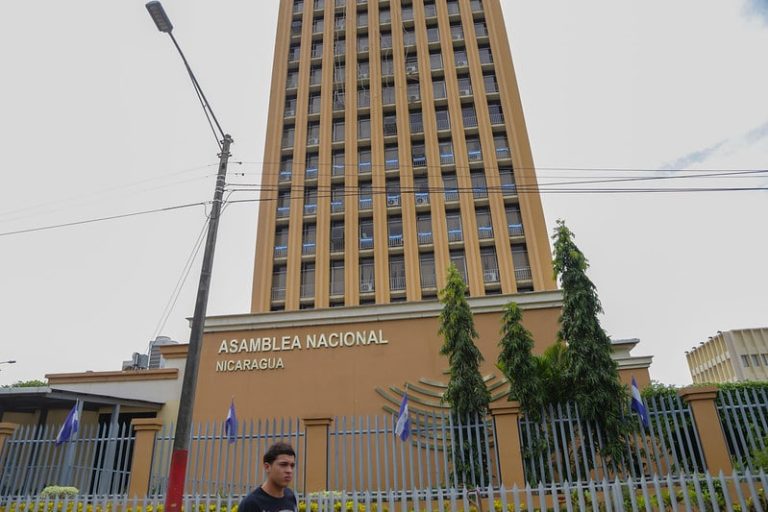17 de mayo 2022

Children of Exile: The Births “Sowing Hope” in the Camp of Nicaraguan Farmers

PUBLICIDAD 1M
PUBLICIDAD 4D
PUBLICIDAD 5D
Women’s organizations, and others for local development, public participation, and environmental protection are the new victims in the onslaught

After the rubber stamp
The crusade of the Ortega-Murillo regime against civil society organizations will continue next week in the National Assembly, where there is already —on the agenda of May 17— an initiative for a Legislative Decree for the Cancellation of the Legal Status of 25 more non-profit civil associations and foundations.
After the rubber stamp, it will raise to 169 the number of NGOs canceled by the regime so far in 2022. Since the civic rebellion of 2018, a total of 243 associations, universities, foundations, and other non-profits have been summarily shuttered.
The imminent cancellation of the 25 organizations in the National Assembly, controlled by Ortega, responds to a Ministry of Interior (Mingob) request accusing them of having “failed to comply with their legal obligations” and “acted against the law.”
The laws that allegedly transgressed all NGOs are the Law for the Regulation and Control of Non-Profit Organisms, as well as the Law against Money Laundering, Financing Terrorism and Financing the Proliferation of Weapons of Mass Destruction and its regulations.
According to Franya Urey Blandon, the head of Mingob, the NGOs did not present their financial statements according to fiscal periods with detailed breakdowns (income, expenses, trial balance, details of donations, origin, provenance and final beneficiary)”; She also points out that they have expired boards of directors and that they are not accountable for previous donations from abroad.
“With these actions, the aforementioned NGOs have hindered the control and surveillance of the Department of Registration and Control of Associations of the Ministry of the Interior,” warns the legislative initiative presented by the Ortega deputy Filiberto Rodríguez. “By not reporting their financial reports according to fiscal periods and with detailed breakdowns, they did not promote a transparency policy in the administration of the funds, not knowing their execution and if they were in accordance with their objectives and purposes, for which they were granted legal status,” he added.
Contrary to the government’s allegations, the directors of organizations canceled in recent months point out that on repeated occasions during recent years the Ministry of the Interior refused to receive the requested documentation and every time they appeared at the Migob windows they were rejected with new requirements.
Sociologist María Teresa Blandon, director of La Corriente, one of the NGOs canceled on May 4, described the decision of the deputies as “an illegal act” because it violates the constitutional right to freedom of association. She highlighted the work that organizations have carried out in the vacuum generated by the State, mainly with women and groups of sexual diversity.
Maria Teresa Blandon added that this attack against civil society organizations responds to a “policy of devastation, of silencing”, and that it seeks to “deactivate us, demobilize us and impose a single form of participation, a single form of organization that is controlled by the regime. It is part of a typical policy of authoritarian governments.”
Two weeks earlier, on April 20, the executive secretary of the Permanent Commission on Human Rights (CPDH), Marcos Carmona, denounced that the Nicaraguan government had outlawed humanitarian organizations to prevent them from documenting abuses of authority and also recalled that his NGO had tried to deliver their documents to the Ministry of the Interior and that they refused to receive them.
“There is no will, on the part of the Government, to allow human rights organizations that are documenting the abuses that are committed in this country,” said Carmona at a press conference.
—Fundación Pro-Rescate de los Jóvenes en Pandillas.
—Fundación Puntos de Encuentro para la Transformación de la Vida Cotidiana.
—Asociación para el Desarrollo Integral Acompañado de Nicaragua y sus Comunidades.
—Asociación Vida Plena (Asovip).
—Asociación Ministerio Generación sin Código.
—Fundación Nueva Esperanza y Vida (FNEV).
—Asociación Lazos de Amor y Esperanza (Aslae).
—Asociación Instituto de Estudios para la Gobernabilidad y Democracia.
—Asociación Instituto Nicaragüense del Cemento y del Concreto (Incyc).
—Fundación Civil Nicaragüense para la Conservación y el Desarrollo (Funcod).
—Fundación Centro de Orientación para la Exportación de la Micro, Pequeña y Mediana Empresa (Coemipyme).
—Asociación por Masaya Primero (PMP).
—Asociación Red Municipal de Jóvenes de Nueva Guinea (RMJ-NG).
—Fundación Centro de Relaciones Internacionales (CRI).
—Fundación Civil para el Apoyo a Mujeres Víctimas de la Violencia.
—Asociación de Señoras de Abogados de Nicaragua (ASAN).
—Asociación Centro para la Participación Democrática y el Desarrollo.
—Asociación Centro de Estudios y Formación para la Gobernabilidad Democrática y el Desarrollo Sostenible.
—Fundación de Desarrollo Habitacional Ambiental de Bajo Costa Bambú, Palma y Adobe de Nicaragua (Funbambu Nicaragua).
—Fundación Interconexión Humana, Ubuntu (Fundación Ubuntu).
—Asociación de Desarrollo Forestal Campesino (Adeprofoca).
—Asociación Centro Alternativo para Mujeres Sobrevivientes de Violencia Izel (CAMSV).
—Fundación de Mujeres por el Desarrollo y la Democracia de Nicaragua (Fumdenic).
—Asociación Americana de Agroquímicos de Nicaragua (ANIC).
—Fundación para el Desarrollo de la Cirugía Reconstructiva en Nicaragua (Fundación Nicaplast).
This article was originally published in Spanish in Confidencial and translated by Havana Times
PUBLICIDAD 3M
Confidencial es un diario digital nicaragüense, de formato multimedia, fundado por Carlos F. Chamorro en junio de 1996. Inició como un semanario impreso y hoy es un medio de referencia regional con información, análisis, entrevistas, perfiles, reportajes e investigaciones sobre Nicaragua, informando desde el exilio por la persecución política de la dictadura de Daniel Ortega y Rosario Murillo.
PUBLICIDAD 3D